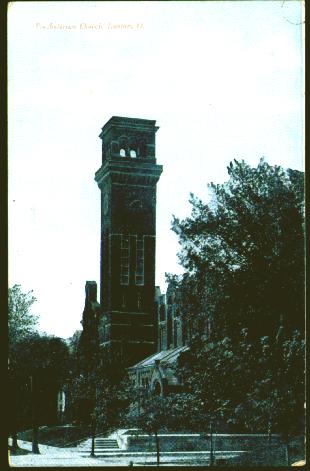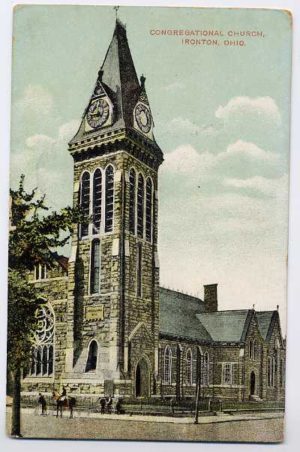THE MULBERRY BUSH
By David Wright
No Source Given
Congregational Church and Presbyterian Church Clocks – The first recorded labor dispute between the city fathers and a city employee took place 91 years ago next month – in December 1875 – when the town’s clock-winder went on strike.
We don’t hear much about clock winders anymore. They, like the chimney sweeps and the lamplighters, played their parts in early America and went their way. But Ironton’s clock winder holds a special place in the city’s heart – he almost caused a rupture in church-state relations.
 It all started over religion, as most arguments do. The Presbyterian Church was first organized here in 1850, and the church trustees decided they needed a building. So they built one, and in 1865 they put up a spire containing an $800 clock.
It all started over religion, as most arguments do. The Presbyterian Church was first organized here in 1850, and the church trustees decided they needed a building. So they built one, and in 1865 they put up a spire containing an $800 clock.
 In 1872 a split apparently developed within the congregation, and that May some 32 people, most of them former Presbyterians, organized a Congregational Church. Their pastor was the Rev. J. H. Young, who was a Presbyterian minister from 1864 to 1871. They completed their own church building in 1875 at a cost of nearly $62,000, and they put their own clock in their own steeple.
In 1872 a split apparently developed within the congregation, and that May some 32 people, most of them former Presbyterians, organized a Congregational Church. Their pastor was the Rev. J. H. Young, who was a Presbyterian minister from 1864 to 1871. They completed their own church building in 1875 at a cost of nearly $62,000, and they put their own clock in their own steeple.
According to the newspapers of the time, the Presbyterians did not relish having their own church building compared to a brand new Congregational building, so they decided to build another church with a higher steeple.
Shortage in the market for pig iron made money tight about this time, and the fact that the contractor cheated them in the brick and stonework set them back at least once, but in 1873, they enclosed their old clock in a 100-foot high steeple.
Enter Bixby. Bixby was the clock winder. He received $50 a year for winding the clock in the Presbyterian Church and keeping it repaired. (By an odd coincidence, Bixby had sold the clock to the Church in the first place). In 1875, Bixby promptly presented City Council with a bill for $80 for repairs to the clock in the Presbyterian Church, made necessary, he insisted, “by the extended altitude of the old clock.”
Council had made the mistake of giving the Presbyterian Church $200 in the first place for the original church after contributions stopped coming before the building was completed.
Anyhow, Bixby presented the city fathers with the bill. Council balked at paying it. Bixby balked at Council’s refusal to pay and simply went on strike and let the clocks run down.
The Ironton Register said of the disagreement that “Council had refused to pay to run the clocks unless they belonged to the city.” But the Ironton Democrat was more poetic: “Indian rings, whiskey rings, canal rings, Boss Shepard rings, but no longer ring the hour of the day in Ironton. The clocks are stopped and the cranks are gone. With a view of killing two birds at once, in more than one particular, our clock-winder struck on our city council for back pay, so to speak…”
The Register simply reported that watchmakers were doing a booming business fixing all the old clocks that people had let run down. It also suggested that the council tax all property abutting on the churches in order “to keep up the town clocks.”
The Democrat was slightly more specific: “Council has concluded to find out if the city runs the clock, or the clock runs the city, or if Bixby runs both with a church or two thrown in.”
The paper even accused the Presbyterians of putting up a tall steeple in competition with the Congregationalists “with a sharp point at the top, as a sort of emblem of the direction their thoughts were supposed to take on Sundays.”
It ran four separate headlines over one story: “A town clock in search of an owner”; “Collusion of church and state”; “Was it a conspiracy to inveigle money from our city treasury?”; and “Tick or not tick, that is the question.”
Meanwhile, Bixby conducted his one-man strike.
The issue was finally settled about two weeks later when Council agreed to pay Bixby’s bill and assume charge of the clock belonging to the Presbyterians. After some discussion councilmen also agreed to hire the lowest bidder to wind up both clocks. Clay Henry got the job for $90 a year.
There have been other labor disputes with the city, but probably none was ever settled so quickly for so little. And there were no reports of panic among the citizenry, as we might expect today if time stood still downtown.

0 Comments